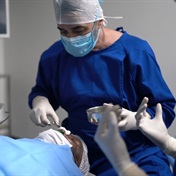
Setting up a telemedicine screening option for patients in primary care clinics can catch many potential eye problems early on. But that sends more patients to eye doctors, who need to be prepared for the influx, according to a new study from the Veterans Health Administration.
Researchers at the Atlanta VA Medical Centre used two years of medical records to analyse what happened when retinal cameras were placed in primary care clinics to monitor for diabetes-related eye problems.
Read: Eyecare myths you probably believed
Trained nurses used the specialized cameras to take pictures of the retinas of patients with diabetes, which were then sent to eye specialists or medical image readers for analysis.
Serious eye problems
If an image reader spotted a sight-threatening abnormality, the patient was referred to an ophthalmologist at a separate but affiliated clinic.
"It's a very useful way to screen patients who are at high risk for eye problems, like diabetic patients," Dr Mary G. Lynch told Reuters Health. "The VA has made a very big priority of putting cameras in all the little outpatient primary care clinics, but it would be nice to know what to prepare for in the big house," she said, referring to the eye clinic where the patients are sent.
Lynch worked on the study in the Ophthalmology Section of the Atlanta VA Medical Centre in Decatur, Georgia.
Diabetes can cause eye conditions like retinopathy or macular oedema, which may lead to blindness. Many US medical authorities recommend annual eye checks for people with diabetes, but patients are often not aware of their vision risk.
Lynch and her team examined the medical records of the nearly 2 000 patients who were screened at local VA clinics between the fall of 2008 and the spring of 2009, 465 of whom were referred to an eye care clinic.
Patients were most commonly referred for nonmacular diabetic retinopathy or nerve-related problems, according to results published in JAMA Ophthalmology.
Just over half of those who were referred were actually seen in the eye clinic within two years. But 36% of the people who did keep their appointment at the eye clinic needed at least three visits, indicating serious eye problems, Lynch said.
Cost effective screening
"We have pointed out a lot of glaucoma suspects, with a suspicious looking nerve, and that's a blinding and curable condition," she said.
So-called teleretinal screening is cost-effective because it avoids many unnecessary in-person consultations while accurately identifying patients who need referral to an ophthalmologist for further care, Dr. Beau B. Bruce told Reuters Health by email.
Read: Why regular eye tests are important
Bruce, from the department of ophthalmology at Emory University School of Medicine in Atlanta, works with Lynch's team but was not part of the new study.
"The authors showed that there was good agreement and sensitivity for the conditions studied (i.e., there was no sacrifice in the quality of the care)," he said. "Likely this screening brought sight-threatening disease to earlier attention and therefore treatment."
The results of this study could help other health systems decide how to divvy up their eye care resources when they bring in the cameras, Lynch said.
Nearly a quarter of the patients screened at the VA clinics were referred to an eye clinic. That figure may be a bit higher than in other health systems, given that the Atlanta VA is located in a region with many other health issues, she said.
Read: Eye diagnosis: art or science?
But health systems can still get a sense of what types of eye problems will be most common among referred patients. That can help the eye care clinic affiliated with teleretinal screening programmes allot medications and specialist doctors to deal with the influx of patients, she said.
"These resource issues are all addressable ahead of time," Lynch said.
Teleretinal screening has its uses, said Dr Hugh R. Taylor, president of the International Council of Ophthalmology and a professor at the University of Melbourne in Australia. But even in the closed system of the VA almost half of patients who were referred did not show up for their eye clinic appointment, and the screening may not work as well in the general population, he told Reuters Health.
"The real issue is having the equipment to capture the images, take the photos, and people who can use it," Taylor said.
Read more:
Eyes a window to brain health
Gender differences in vision IQ
Your eyes are very vulnerable




 Publications
Publications
 Partners
Partners











